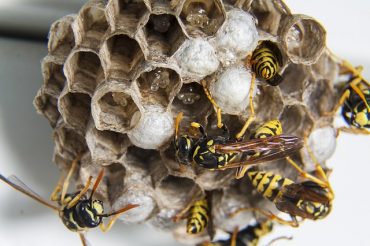

There is a significant increase in flying/stinging insect attacks in the fall months. In this article we will go over the reasons that this occurs.
Even though we live in beautiful sunny and warm Florida, there is still a mild season change and we do have a few freezing nights here and there. Certain insects could not survive these period of the year without first going into hibernation. In hibernation, they slow their metabolic rate and bury themselves deep in a structure. This is exactly what the queen of any flying insect is preparing to do in the fall months.
For this reason, the hive is most active in the fall months. The worker wasps/hornets are building more shelter and the queen is settling in for a slumber. Meanwhile, the guardians of the hive are on extra alert. When they see you gardening or fixing a shutter on a house, they don’t know what your intentions are. Their job is to keep you away. So, the flying-stinging insect may attack you.
One way to keep this from happening is to keep the nest from taking hold in the first place. In the summer months, stay vigilant and patrol the eaves of your home. Look for any budding nests. At night time, when they are all tucked away for the evening, spray them with a wasp spray that has a good long stream. If you make it to November or December without any new nests popping up, you should be fine until spring.
If you are dealing with a regular honey bee colony you must call a professional to remove and relocate the bees. They are a desired species and should not be killed.
If you see a wasp nest and don’t want to risk your safety dealing with it, call your local pest professional today. If you receive a wasp sting, here is some good information for you.
